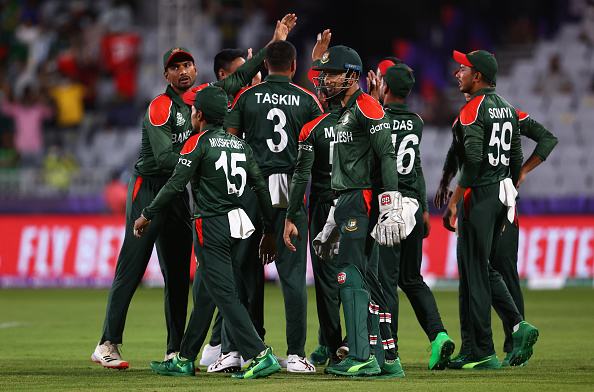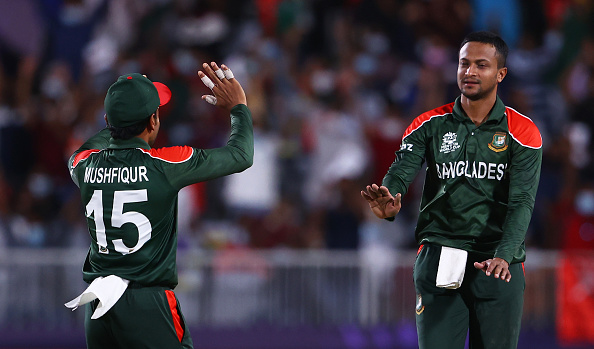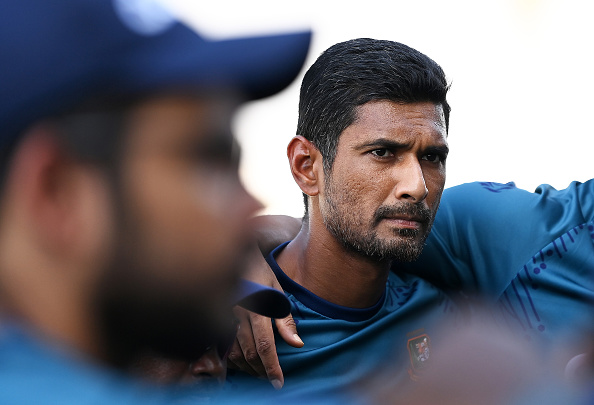 OPINION
OPINIONBangladesh’s T20 World Cup debut was a memorable one. In the inaugural 2007 World T20 at the Wanderers in Johannesburg, they thumped West Indies by six wickets to qualify for the Super 8s. Laying the foundation for the win was a 21-year old Shakib al Hasan with figures of 4-34 and added 13 runs to the chase of 165. Bangladesh, a rookie team in the cricketing world, had sent a traditional powerhouse like West Indies packing just like they did to India few months ago in the 50-over World Cup.
“We have made the Super 8s in two big tournaments this year and it is about time they stop calling us a minnow. There is more to come from Bangladesh,” was Mohammad Ashraful’s message to the cricketing world after that win.
Ashraful’s hopeful words have remained at that, just hopeful. A bitter reality had set in.
Fast forward to October, 2021. Shakib, now 34 years of age, with a wealth of experience and an established star, reflected the Bangladesh’s rise to the sport’s crema. However, being a Test-playing nation for over two decades, featuring in the past three ODI World Cups and possessing a talented squad didn’t change their fate in the shortest format.
Among countries which have played 10 T20 World Cup matches or more, Bangladesh have the worst win percentage of 21.8 – a mere seven wins from 33 matches. Their latest 2021 World T20 campaign was an unmitigated disaster as they lost all of their five Super 12s matches after scraping through the qualifying phase. Over a period of three weeks, they lost to Scotland and were bundled out for below 100 scores against South Africa and Australia.

“The current team management looks like a rehab centre, where previously jobless South African coaches have been given jobs,” former captain Mashrafe Mortaza said in a Facebook post after the loss against Sri Lanka. It was a merciless jab at head coach Russell Domingo, fielding coach Ryan Cook and batting consultant Ashwell Prince, who had replaced former Proteas teammate Neil McKenzie prior to the tournament.
Former Bangladesh Cricket Board (BCB) chief Saber Hossain Chowdhury took the mudslinging to social media as he attacked his successor Nazmul Hasan Papon.
“Bangladesh has now played four World Cups under Mr Papon, things have gone from bad to worse. Longest-serving President has also been the most incompetent. It's always someone else’s fault as he has run our cricket to the ground. Shame that we have a shameless @BCBtigers,” he wrote on Twitter.
Mortaza’s distasteful comments targeting the coaching staff members’ nationality and Chowdhury’s dig at his political rival highlight the recurring issues of unruly behaviour and lack of accountability within Bangladesh cricket.

In the current team, Shakib, T20 World Cup’s seventh-highest run-scorer and its highest ever wicket-taker, has a well-documented history of letting his emotions run wild. From making an offensive gesture towards TV cameras from the dressing room in 2014 to the recent incident of kicking the stumps during a Dhaka Premier League match, his issues do not lend to a healthy image as the country’s greatest all-rounder. Sure, Shakib is human and cricket is an emotional game, but repeated offences after spending over a decade at the highest level reflect poorly on youngsters in the dressing room.
Another senior in the team, Mushfiqur Rahim had come a long way from his premature taunts during the 2016 World Cup match against India they lost by a single run. He has learned to carry himself better which helped his batting immensely.
However, his recent slump in form and the criticism that followed saw him launch a tirade against his detractors telling them to “see their own faces in the mirror.” While that comment can be looked at from a different lens, Mushfiqur singling out Liton Das’ missed catches as a reason for the defeat against Sri Lanka suggested at a disjointed dressing room.
“Our mistakes were the two dropped catches of Liton despite the fact that he is a very good fielder and it could have been a different story if it was me as he is a better fielder. At the same time it was in a very crucial stage of the game as the two lefty batters (Charith Asalanka and Bhanuka Rajapaksa) were batting really well,” he said after the Super 12s match defeat.
The likes of Shoriful Islam and Shamim Hossain were infamously involved in an ugly spat during the 2020 U19 World Cup final against India which ended a scuffle after the match ended. Besides the suspensions and demerit points handed out by the ICC for on-field behaviour, it is up to the team management and the seniors to groom the youngsters to keep their emotions in check.
On the playing side of things, the BCB prioritizing record-making over player development has seriously affected their T20I credentials. From the 120 T20Is they have played since their first game in November 2006, Bangladesh have played 49 matches at home out of which 36 matches were played at the Shere Bangla National Stadium in Dhaka. Despite winning back-to-back series against Australia and New Zealand, Bangladesh’s overall record at the venue stands at 18 wins and 18 losses – four of which have come in the T20 World Cup.

Trying to helplessly douse a wildfire of criticism and blame game was captain Mahmdullah Riaz. While facing the press after the eight-wicket defeat to Australia, the 33-year old tried his best to answer questions over his retirement, changes in the coaching staff and his captaincy.
“I can’t comment on it (T20I retirement). It is not in my hands. The decision is the cricket board’s. I have tried to keep the team together, to get the best out of the team. But definitely, there were shortcomings from my side,” he said.
In a recent press conference, BCB president Nazmul Hasan had announced that the Board has remained financially stable in times of covid and has been able to create a fixed deposit receipt of Tk (Bangladeshi Taka) 900 crore in the last two terms. However, covid also meant that bilateral series in Bangladesh were played at a single venue within a short span of time where the pitches on offer are rank turners. With financial clout to boast, it is high time the BCB spends on providing versatile pitches that can make Bangladesh more than just a one-trick pony.
Fortunately, they will not have to go through the qualifying phase in next year's T20 World Cup in Australia, thanks to their superior ranking. But if the current rot is not stopped, the listless performances in the shortest format will carry on into the future.